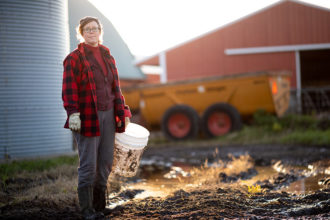A course in skills-based suicide alertness prepared Ruth Linkenmeyer-Meirick for a desperate call from a friend. “She was going through a divorce, and she was so overcome by grief and sadness it was hard to talk with her,” says Meirick. “Had I not taken the course, I wouldn’t have known what to do.” Meirick was able to ask her friend a difficult but important question: “You’re not thinking about death by suicide, are you?” Her friend replied that she was not, and from there, Meirick listened and offered crisis-intervention suggestions.
Meirick understood how to help her friend because she had recently attended the skills-based suicide-prevention training called safeTALK. The training sessions were adapted to address the unique characteristics of agricultural communities. Through her work as the foundation director of the Minnesota Farm Bureau, Meirick has helped to make similar workshops available to Farm Bureau agents and others throughout the state.
The adapted trainings, called safeTALK: Preventing Suicide in Agricultural Communities, resulted from a multi-pronged Minnesota project titled Trying Times: Tools to Understand and Alleviate Farm Stress. The USDA Sustainable Agriculture Research and Education (SARE) program funded the two-year project. The Minnesota Department of Agriculture (MDA) managed the grant, which involved multiple partners in the public sector and nonprofit community.
The SARE funding permitted project organizers to refine a previously developed workshop called Down on the Farm: Supporting Farmers in Stressful Times. They collaborated with AgCentric, which is part of the Minnesota State college system, to create a curriculum enabling people in and beyond Minnesota to adapt and deliver it themselves.
The refined curriculum is available for download at mnfarmstress.com at no cost, and the MDA encourages users to adapt for their own state, region and audience.
This story is part of a series highlighting SARE projects using innovative strategies to help farmers and ranchers manage stress. Visit https://www.sare.org/resources/managing-stress/ for more information.
